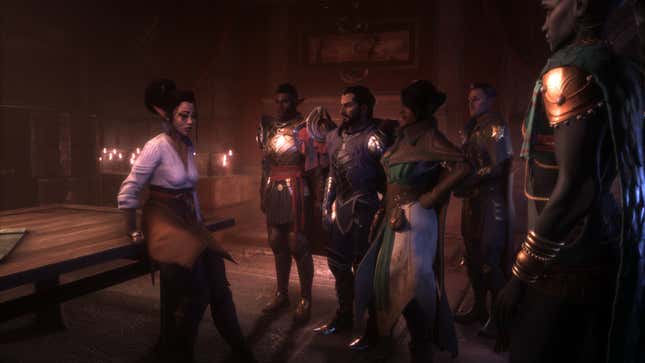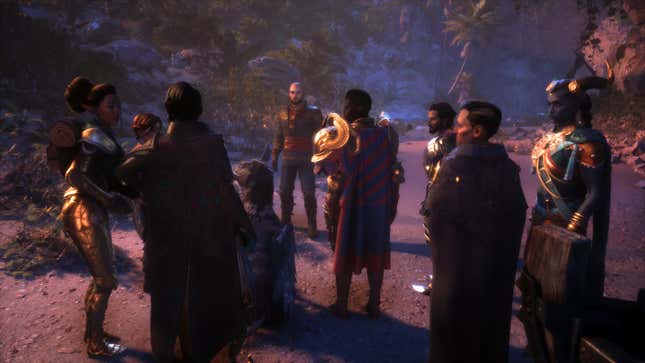Dragon Age: The Veilguard’s late-game choices have got players in their feelings, as they require some pretty big sacrifice on your part. But why did developer BioWare choose to make you do something so difficult? In an interview with IGN, Game Director Corinne Busche and Creative Director John Epler explained that it was basically For The Plot—specifically, the plots of the characters involved and how their individual arcs connect to the game’s overarching story.

In the interview, Busche and Epler were asked why players are required to choose between having either Tevinter mage Neve or elven Veil Jumper Bellara perform a dangerous task in the endgame, which ultimately results in the chosen character being captured and enslaved at the hands of The Veilguard’s evil elven gods. This removes them from your party for the remainder of the game, as they are blighted and controlled during the game’s final battle in the city of Minrathous. Whoever is kidnapped does defy the elven gods in the end, and as painful as it might be to pick between two of your faves, BioWare says this was all in service of the two’s respective stories, whether that be as an elven historian or a Tevinter reformist. As Epler explained to IGN:

So for Neve and Bellara, the two groups that have been the most directly affected by the gods up to this point are obviously the elves – it’s their gods that are back – and Tevinter, Minrathous. You know, the Venatori have either fully seized power or have made some pretty big inroads in Minrathous, depending on which city you save. And the gods have come back and brought their dragons and proclaimed them as the gods of the Tevinter people. So both Bellara and Neve have a direct investment. Not that everyone else doesn’t, but they have the most direct investment in stopping the gods at this point. We wanted to give you that choice between these two characters who, again, have a very personal score to settle with the gods and are both mages whereas Emmrich obviously wants to stop the end of the world, but doesn’t have quite that same connection to the events that are going on. So those two made the most sense as to who would disable them.
The other thing is something that shows up in the visuals. Minrathous, Tevinter in general has always been kind of…there’s echoes of ancient elven magic in everything to Tevinter and Minrathous does because it’s meant as almost a cargo cult imitation of what the ancient elves were capable of. The ancient elves worked lyrium into their buildings, Tevinter uses gold and jewels because they don’t have the capacity to work lyrium. So it made the most sense for them.”
But that’s not the only sacrifice you’re forced to make in The Veilguard’s final push. The more (potentially) permanent choice is between the dwarven scout Harding or the elven warrior Davrin. At the beginning of the final mission, the player must pick one of the two to lead a distraction team as the party begins an assault on the elven god’s base. At the end of this first act, whoever you chose will sacrifice themselves to give the rest of the team an opening and kill one of the gods. According to Epler, Harding was always one of the characters the team planned on putting at risk, while Davrin became the second choice as his story as a Grey Warden formed during development.

“We knew Harding had to be one of them, and then we had to ask ourselves: we’ve got a fan favorite returning character from Inquisition,” Epler said. “Who could possibly equal that in terms of making this difficult choice? It’s like, well, Assan. Assan and Davrin. Davrin obviously has a direct link to this at this point because of Weisshaupt. He’s got a very personal stake in it, and it made sense for the two of them to be the ones to be the choice to lead the distraction team, because again, we want to find those personal connections between the characters and the events that are going on. And, you know, the case of Harding, she has so much investment in this story because she’s been living it since Inquisition. And then Davrin. Davrin’s entire order just fell at the end of the previous act. He’s going to have a real strong investment in stopping the guys too here.”
The choices are impactful in and of themselves, of course, but as Epler and Busche noted, they can also be complicated further by other things happening in your party when the time comes to make your last stand.
“One thing that’s so interesting about that choice too, the Harding and Davrin choice is it actually presented some interesting complexity and some emotional investment we could tie into, which always makes for a more satisfying, I will say harder choice to make,” Busche said. “I’ll say in one of my playthroughs, Taash and Harding were in a relationship together and I happened to be romancing Davrin. Impossible. Impossible decision in that moment.”
While either Bellara or Neve can definitively survive if they’re chosen, the ultimate consequences of the Davrin or Harding choice seem a little ambiguous right now. While neither appears for the rest of the game, fans are latching onto codex entries and dialogue that implies they might still be alive as they look for hope that whoever is lost in the fight may return in the next Dragon Age. Alas, we probably have a long time to wait before we know anything about that game, as BioWare has shifted its focus to the upcoming fifth Mass Effect.


